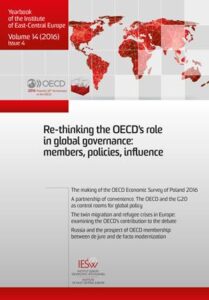Pages: 55-70
Edition: Lublin 2016
DOI: --
Citation method: Szent-Iványi, B. (2016) ‘Irrelevant or transformative power? The OECD DAC and foreign aid policies in Central and Eastern Europe’, Yearbook of the Institute of East-Central Europe (Special Issue: Visvizi, A. (ed.) Re-thinking the OECD’s role in global governance: members, policies, influence), 14(4): 55-70.
Abstract:
The paper examines the impact of the OECD’s Development Assistance Committee (DAC) on the emerging foreign aid policies of the Central and Eastern European (CEEs) countries. The Czech Republic, Poland, Slovakia and Slovenia joined the DAC in 2013, and the committee has aimed to socialise them into the norms of the international development system. Generally, however, there is little evidence of impact due to the soft nature of the DAC’s policy recommendations, and the fact that the committee, reacting to the challenges to its legitimacy from non-Western donors, has become much less demanding towards potential members than in the past. The paper, however, argues that one must examine the processes of how the norm and policy recommendations of the DAC are mediated domestically. The case of the Czech Republic’s reforms in its foreign aid policy between 2007 and 2010 shows that domestic actors can use the OECD strategically to build support for their own cause and thus achieve seemingly difficult policy reform.

PDF: Download